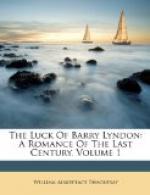What was the poor, lonely, and broken-hearted man to do? I took the annuity, and was declared outlaw in the course of next week. The rascal Quin had, I found, been, after all, the cause of my undoing. It was he devised the scheme for bringing me up to London; sealing the attorney’s letter with a seal which had been agreed upon between him and the Countess formerly: indeed he had always been for trying the plan, and had proposed it at first; but her Ladyship, with her inordinate love of romance, preferred the project of elopement. Of these points my mother wrote me word in my lonely exile, offering at the same time to come over and share it with me; which proposal I declined. She left Castle Lyndon a very short time after I had quitted it; and there was silence in that hall where, under my authority, had been exhibited so much hospitality and splendour. She thought she would never see me again, and bitterly reproached me for neglecting her; but she was mistaken in that, and in her estimate of me. She is very old, and is sitting by my side at this moment in the prison, working: she has a bedroom in Fleet Market over the way; and, with the fifty-pound annuity, which she has kept with a wise prudence, we manage to eke out a miserable existence, quite unworthy of the famous and fashionable Barry Lyndon.
Mr. Barry Lyndon’s personal narrative finishes here, for the hand of death interrupted the ingenious author soon after the period at which the Memoir was compiled; after he had lived nineteen years an inmate of the Fleet Prison, where the prison records state he died of delirium tremens. His mother attained a prodigious old age, and the inhabitants of the place in her time can record with accuracy the daily disputes which used to take place between mother and son; until the latter, from habits of intoxication, falling into a state of almost imbecility, was tended by his tough old parent as a baby almost, and would cry if deprived of his necessary glass of brandy.
His life on the Continent we have not the means of following accurately; but he appears to have resumed his former profession of a gambler, without his former success.
He returned secretly to England, after some time, and made an abortive attempt to extort money from Lord George Poynings, under a threat of publishing his correspondence with Lady Lyndon, and so preventing his Lordship’s match with Miss Driver, a great heiress, of strict principles, and immense property in slaves in the West Indies. Barry narrowly escaped being taken prisoner by the bailiffs who were despatched after him by his lordship, who would have stopped his pension; but Lady Lyndon would never consent to that act of justice, and, indeed, broke with my Lord George the very moment he married the West India lady.
The fact is, the old Countess thought her charms were perennial, and was never out of love with her husband. She was living at Bath; her property being carefully nursed by her noble relatives the Tiptoffs, who were to succeed to it in default of direct heirs: and such was the address of Barry, and the sway he still held over the woman, that he actually had almost persuaded her to go and live with him again; when his plan and hers was interrupted by the appearance of a person who had been deemed dead for several years.




